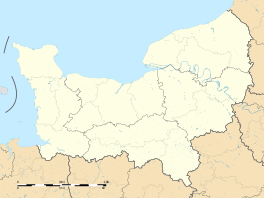Ranville
| Ranville | ||
|---|---|---|
 |
||
|
||
| Coordinates: 49°13′55″N 0°15′23″W / 49.2319°N 0.2564°WCoordinates: 49°13′55″N 0°15′23″W / 49.2319°N 0.2564°W | ||
| Country | France | |
| Region | Normandy | |
| Department | Calvados | |
| Arrondissement | Caen | |
| Canton | Cabourg | |
| Intercommunality | Campagne et Baie de L'Orne | |
| Government | ||
| • Mayor (2008–2014) | Jean-Luc Adélaïde | |
| Area1 | 8.42 km2 (3.25 sq mi) | |
| Population (2008)2 | 1,703 | |
| • Density | 200/km2 (520/sq mi) | |
| Time zone | CET (UTC+1) | |
| • Summer (DST) | CEST (UTC+2) | |
| INSEE/Postal code | 14530 /14860 | |
| Elevation | 1–49 m (3.3–160.8 ft) (avg. 26 m or 85 ft) |
|
|
1 French Land Register data, which excludes lakes, ponds, glaciers > 1 km² (0.386 sq mi or 247 acres) and river estuaries. 2Population without double counting: residents of multiple communes (e.g., students and military personnel) only counted once. |
||
1 French Land Register data, which excludes lakes, ponds, glaciers > 1 km² (0.386 sq mi or 247 acres) and river estuaries.
Ranville is a commune in the Calvados department in the Normandy region in northwestern France.
Ranville was the first French village liberated on D-Day. The village was liberated by the British 13th Parachute Battalion, commanded by Lieutenant-Colonel Peter Luard. The château du Heaume in the village was subsequently used by the headquarters of the British 6th Airborne Division.
The village features heavily in the book "13 - Lucky For Some" which is about the history of the 13th (Lancashire) Parachute Battalion. There are many then and now photographs as well as maps and diagrams of battles that took place in the region.
A Bailey bridge section at the Memorial Pegasus museum in Ranville
The Château de Guernon-Ranville
...
Wikipedia



